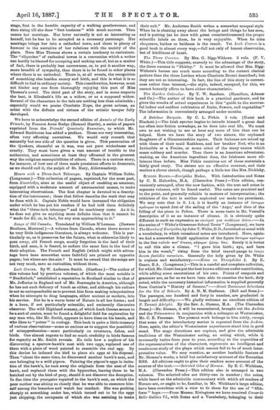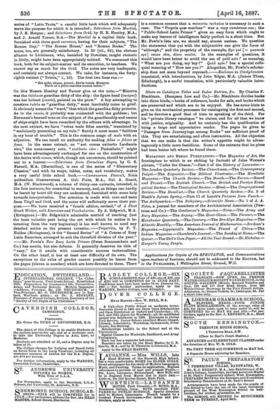Scuoot Boons.—Euripides Medea. With Introduction and Notes by C. B.
Heberden, M.A. (Clarendon Press.)—This edition, con- veniently arranged, after the new fashion, with the text and notes in separate volumes, will be found useful. The notes are practical and to the point, and generally reliable in matters of interpretation ; the criticism of the text is neither neglected nor made too prominent. We may note that in II. 1.4, it is hardly an instance of Vol-epee Irmirepor to speak first of the sailing of the 'Argo,' and then of the felling of the pines in Fallon. There is more taste in Mr. Verrall's description of it as an instance of climax. It is obviously quite different to such an expression as castigat qua auditgue
the series of " White's Grammar-School Texts" (Longman), we have The Hecuba of Euripides, by John T. White, D.D., tarnished as usual with a vocabulary, in which occasional notes are introduced. Here, again, we find a somewhat frigid application of the figure gorspor notbmpar in the line .raii,rrie "-or' tremor, mdcbspor Cairn, Ivo. Sorely it is better to call this also a climax. "I gave him birth ; aye, and bare him in the womb," rising from the brief travail-pangs to longs decem fastidia tnensium. Generally the help given by Dr. White is copious and satisfactory. Notes on Thucydides I. By E. Gears, B.A. (Longmans.)—This is a careful and complete collection, for which Mr. Genre has put the beat known editions under contribution, while adding some annotations of his own. Points of exegesis and grammar are, as far as we have been able to examine the book, duly noted, while the necessary historical information is supplied generally from Carotins's "History of Greece."—Greek Testament Selections for the Use of Schools. By A. M. M. Stedman. (Bell and Sons.)— The passages, one hundred and forty in number, are graduated in length and difficulty.--We gladly welcome an excellent edition of P. Terenti Adelphi. By the Rev. A. Woman, M.A. (The Clarendon Press.)—Mr. Slower], it will be remembered, brought out the Andria and the Trinummus in conjunction with a colleague at Westminster, Mr. C. E. Freeman. The present work belongs to him solely, except that some of the introductory matter ie repeated from the Andria. Here, again, the editor's Westminster experiences stand him in good stead. The stage directions are copious, and give the admirable traditions of the Westminster acting, an voting which, while it necessarily varies from year to year, according to the capacities of the representatives of the characters, represents an intelligent and continuous study of the plays which cannot fail to be of much inter- pretative value. We may mention, as another laudable feature of Mr. Sloman's works, a brief bat satisfactory account of the Terentian MSS. All editions ought to give their readers some account of the sources of the text.—Selected Odes of Horace. By E. C. Wickham, M.A. (Clarendon Press.)—This edition also is arranged in two volumes. The selected odes are thirty-one in number ; the notes, while based on the admirable commentary with which all readers of Horace are, or ought to be, familiar, in Mr. Wiokham's large edition, have been rewritten with a view to fit them for the use of " fifth. form " boys.—From Messrs. llivingtons we have received Cesar de Bello Gallic° VI., with Notes and a Vocabulary, belonging to their series of "Latin Texts," a careful little book which will adequately serve the purpose for which it is intended ; Selections from Martial, by S. R. Morgan ; and Selections from Ovid, by H. R. Heatley, M.A., and J. Arnold Turner, B.A.—The Martial is a capital little book, furnished with three good excursus, having for their subjects, "The Roman Day," "The Roman House," and "Boman Books." The
notes, too, are generally satisfactory. In 60 64), the obvious allusion to Lioinianus, who, banished by Domitian, taught rhetoric in Sicily, might have been appropriately noticed. We commend this book, both for its subject-matter and its execution, to teachers. We cannot say as much for the Ovid. The notes are very inadequate, and certainly not always correct. We take, for instance, the forty- eighth extract (" Trietia," i., 10). The first two lines run :-
"Hat mihi, Mtge& promo& savior tutela Minervm
Nava et • pieta cassides nomen habet."
On this Messrs. Heatley and Turner give us the note,—" Minerva was the tute/a or guardian deity of the ship the figurehead (insigne) was her helmet (cassis), painted on the prow." A boy attempting to construe tutela as "guardian deity," most inevitably come to grief. It obviously means the "ward," that which the guardian deity protects. As to the cassis, it probably was connected with the goddess ; but Barman's learned note on the subject or the guardianship and names of ships might have been consulted by the editors with advantage. In the next extract, we have "rebus male fidus acerbic," translated by " maliciously presuming on my rain." Surely it must mean "faithless in my hour of trouble." This is the common usage of male with an adjective. We can recall no authority for making fidus fidens or Prue. In the same extract, on " ant comes extinct° Laodamia viro," the unnecessary note, " exstincto tiro Protesilails," might have been advantageously exchanged for one on the construction of the dative with comes, which, though not uncommon, should be pointed out to a learner. Selections from Cornelius Nepos, by G. S. Parnell, M.A. (Macmillan), is one of the series of "Elementary Classics," and with its maps, tables, notes, and vocabulary, makes a very metal little school book.—Oamenarum Flosculi, Notia quibusdam illnatraverunt A. Gal. Potts, M.A., Gal. A. Heard, M.A. (W. Blackwood), a volume of thirty-one extracts, intended, in the first instance, for committal to memory, and, as things can hardly be learnt by heart till they are understood, furnished with some help towards interpretation. The selection is made with cam and taste from Virgil and Ovid, and the notes will sufficiently serve their pur- pose.—We have received a "fourth edition, revised," of A First Greek Writer, with Exercises and Vocabularies. By A. Sidgwick, M.A. (Rivingtons.)—Mr. Sidgwiok's admirable method of teaching (not the least valuable part being the art with which he makes it in- teresting from the very beginning) is too well known to need any detailed notice on the present occasion.—Tripertita, by F. T. Holden (Rivingtons), is the "Second Series" of "A Course of Easy Latin Exercises, arranged to suit the threefold division of the year." —Mr. Fowle's New Easy Latin Primer (Swan Sonnenschein and Co.) has merits, but also defects. It generally deserves its title of " easy," for it avoids with considerable success technicalities. On the other hand, it has at least one difficulty of its own. The exceptions to the roles of gender cannot possibly be learnt from the pages (eleven in number) which are here devoted to them. There is a common consent that a memories technics is necessary in each a case. The "Propria quse maribtei " was a very cumbrous one ; the " Pablic•Sohool Latin Primer" gives an easy form which ought to make any learner of intelligence fairly perfect in a abort time. But Mr. Fowle's lists are, we should say, almost useless. We question the statement that qui with the snbjanotive can give the force of "although ;" and the propriety of the example, Ego qui [= quamvis ego] sense aim, disco mulls. In the examples of questions, it would have been better to avoid the use of quid agis as meaning, " What are you doing, my boy r Quid agie has a special collo- quial meaning of " How are you I" Altogether, Mr. Fowle's scholar- ship does not seem beyond reproach.-1Eschines in Otesiphontem translated, with introductions, by John Edgar, M.A. (James Thom, Edinburgh), is a useful translation, with particularly valuable intro- &Latium.



































 Previous page
Previous page